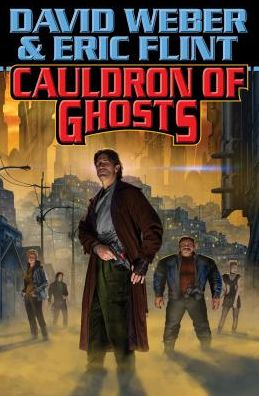It’s probably best not to think too deeply about cover art when it comes to Baen books, but sometimes—often—I can’t help but wonder what the artist was trying to evoke. The central figure on the cover of Cauldron of Ghosts, the third book in the spinoff David Weber Honorverse series co-authored by Eric Flint (after 2009’s Torch of Freedom), is vaguely reminiscent of Mal Reynolds from long-ago Firefly—an association that’s more than a little misleading.
The Republic of Haven and the Star Empire of Manticore have made peace. Now they are facing a combined threat from the Solarian Union, and the secretive Mesan Alignment, underhanded manipulators bent on galactic domination and masterminds of the interstellar slave trade. Also in the mix is the youthful star nation of Torch, inhabited by freed slaves, which has been at war with Mesa since its founding.
The effective intelligence team of Havenite Victor Cachat and Manticoran Anton Zilwicki have—at much hazard and cost—gathered a significant amount of information on the Mesans and their hidden agenda. Now the time has come for them to return undercover to the planet of Mesa, in company with a senior military officer from Torch (Thandi Palane, Cachat’s lover), and Yana, another Torch citizen, to search for more information on the structure and ultimate goals of the Mesan inner circle.
As may be apparent from the preceding paragraphs, this is not a book that will work very well without the context of its series. Investment in the characters and the situations relies to a large extent on previous familiarity from other instalments in this spinoff series, Crown of Slaves and the aforementioned Torch of Freedom, but the reader who is not familiar with events from Weber’s other series—both the main “Honor Harrington” line and the “Saganami” subsidiary—may find themselves slightly at sea.
No, that’s an understatement. You will find yourself at sea.
And if you’ve read those novels, you probably already have a good idea of whether or not you want to read this one, too.
But as recent Weber (and Weber-collaboration) novels go, Cauldron of Ghosts is pretty good. It has fewer talking heads expositing on the State of Interstellar Politics and Our Next Cunning Plans and Our Technical Hardware, and what info-dumping there is—and there is some, because this is still a Weber novel—is made more palatable and more interesting by being delivered by characters about whom we already have a reason to care. Cauldron of Ghosts delivers a solid line in spies doing exciting spy things, and in people fighting for important causes with lots of explosions in an urban environment.
There’s just one problem: “Victor Cachat and company infiltrate Mesa” and “Victor Cachat and company help fight a local revolution against desperate odds” feel like they belong to different books. It is as though each third of the book (which, for the purpose of this review, let’s divide into: “People on Manticore talk about politics/People elsewhere fight slave-traders,” “Victor Cachat and company go to Mesa,” and “Cachat and company go to war”) are thematically, tonally, and narratively distinct: the transitions between them, particularly between espionage and revolution, don’t seem to arise organically from circumstance but instead come with very little warning. One page the reader is looking forward to seeing how the protagonists can gather information on such a secretive conspiracy; the next, we’re in the middle of an urban conflict zone, and information-gathering is no longer at all relevant.
(At times, it doesn’t help that Cachat and company appear to be the Honorverse’s equivalent of indestructible superheroes: Eric Flint is, on the evidence, less willing to kill off characters he’s writing than Weber is.)
There is one other thing about this novel that is particularly annoying. In order to not be recognised when they infiltrate the planet of Mesa, the main protagonists undergo extensive body-sculpting. The narrative dwells uncomfortably on the effect this has had on Yana’s breasts.
“Yana, on the other hand, now had a physique that looked like a teenage boy’s notion of the perfect female figure. A particularly callow boy, at that.”
This point is returned to at length, the male gaze alighting on the size of her breasts until the repetition stops being obnoxious and becomes merely tiresome.
I’m not going to talk about the politics, or the worldbuilding: there are problems with both, but I don’t want to turn this review into a dissertation. In the final analysis, Cauldron of Ghosts is an entertaining instalment in a long-running space opera series; more engaging than its predecessors—but, alas, less engaging than it could be.
Cauldron of Ghosts is available April 8th from Baen
Liz Bourke is a cranky person who reads books. Her blog. Her Twitter.










